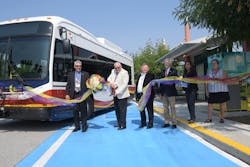Link Transit holds ribbon cutting to celebrate electrification of fleet
Ten 35-foot BYD K9S battery-electric buses have been placed into service on Link Transit’s system.
The buses are supported by four 300kW Momentum Dynamics inductive charging stations.
This milestone was celebrated with a ribbon cutting ceremony held Aug. 19 at Columbia Station in Wenatchee, Wash. This event marks the completion of wireless charger installation at the station and caps 12 years of work to create a fully functional fleet of full-sized extended-range electric transit vehicles capable of traveling the distances demanded of the rural region Link serves.
Link Transit says its project reduces vehicle emissions, creates a cleaner and quieter environment and saves taxpayer money with reliable, low maintenance vehicles running on inexpensive, renewable locally generated hydropower.
“We have pushed the technology at Link Transit,” said Link Transit General Manager Richard DeRock. “We really are a national model for how rural public transportation companies can lead the nation as we build a clean energy economy for America. We have shown that this technology can work in real-world operation on a daily basis, in a variety of conditions.”
These are the third generation of battery electric buses that Link Transit has been working with since the first five 22-foot electric trolleys were delivered in 2014, following numerous delays in production.
This original purchase was funded by TIGGER, part of the American Recovery and Reinvestment Act of 2009. The first purchase of BYD buses in 2016 showed a variety of production and technology issues that affected the reliability and performance of the buses in daily operation. These problems were worked out in the buses that Link Transit is presently operating.
“These electric buses are the most reliable in our fleet and are operating about 30 percent of the total fleet miles. Operating costs for these buses are about one half of a diesel or gasoline powered vehicle,” said DeRock. “Not only are they practical from an environmental perspective, but they make sense financially as well.”
The 300kW Momentum Dynamics inductive wireless chargers are the first of their type to be used in daily operation and will work on any type of battery electric bus, according to Link Transit. They allow buses to charge for a few minutes at the end of each route and not come out of service for an extended period. Link Transit says the range on these buses increases from about 200 miles on a single battery charge to more than 350 miles with periodic charging.
Link Transit plans to replace aging diesel and gasoline powered buses with battery-electric buses and expects to see about 50 percent of its full-size buses be electric by 2023.



